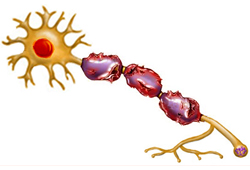Summary
定义
History and exam
Key diagnostic factors
- direct blow to the head or deceleration of the head from an impulsive force
- previous brain trauma, substance use, or alcohol misuse
Other diagnostic factors
- headache
- feeling foggy/slow
- dizziness/balance problems
- memory difficulties
- vomiting/nausea
- neck pain
- normal physical neurologic exam
- abnormalities on neuropsychological testing
Risk factors
- head injury
- previous brain trauma
- alcohol and drug misuse
- poor neck strength
Diagnostic investigations
1st investigations to order
- clinical diagnosis
Investigations to consider
- CT head
- MRI head
Emerging tests
- PET, single-photon emission CT (SPECT) of head
- multimodal MRI technologies
Treatment algorithm
confirmed mild traumatic brain injury
Contributors
Expert advisers
Luke C. Henry, PhD
Assistant Professor
Department of Neurological Surgery
Senior Clinical Neuropsychologist
University of Pittsburgh
Pittsburgh
PA
Disclosures
LCH declares that he has no competing interests.
Maria Twichell, MD
Assistant Clinical Professor
Director
General Rehabilitation Unit
UPMC Physical Medicine and Rehabilitation
University of Pittsburgh Medical Center
Pittsburgh
PA
Disclosures
MT declares that she has no competing interests.
Acknowledgements
Dr Luke C. Henry and Dr Maria Twichell would like to gratefully acknowledge Dr Jeffrey Bazarian and Dr Maryse Lassonde, previous contributors to this topic.
Disclosures
JB has been reimbursed by Roche, the manufacturer of an automated assay for serum S-100B, to attend a conference, and has been reimbursed by Banyan Biomarkers and Neuren Pharmaceuticals to help develop their research protocols. JB is also an author of a reference cited in this topic. ML is an author of several references cited in this topic.
Peer reviewers
Eirik Helseth, MD, PhD
Professor and Consultant
Department of Neurosurgery
Ulleval University Hospital
Oslo
Norway
Disclosures
EH declares that he has no competing interests.
Margot Putukian, MD
Director of Athletic Medicine
Princeton University
Princeton
NJ
Disclosures
MP is an author of a reference cited in this topic.
Peer reviewer acknowledgements
BMJ Best Practice topics are updated on a rolling basis in line with developments in evidence and guidance. The peer reviewers listed here have reviewed the content at least once during the history of the topic.
Disclosures
Peer reviewer affiliations and disclosures pertain to the time of the review.
References
Key articles
Maas AIR, Menon DK, Manley GT, et al. Traumatic brain injury: progress and challenges in prevention, clinical care, and research. Lancet Neurol. 2022 Nov;21(11):1004-60.Full text Abstract
Harmon KG, Clugston JR, Dec K, et al. American Medical Society for Sports Medicine position statement on concussion in sport. Br J Sports Med. 2019 Feb;53(4):213-25.Full text Abstract
Patricios JS, Schneider KJ, Dvorak J, et al. Consensus statement on concussion in sport: the 6th International Conference on concussion in sport-Amsterdam, October 2022. Br J Sports Med. 2023 Jun;57(11):695-711.Full text Abstract
American College of Emergency Physicians Clinical Policies Subcommittee (Writing Committee) on Mild Traumatic Brain Injury; Valente JH, Anderson JD, Paolo WF, et al. Clinical policy: critical issues in the management of adult patients presenting to the emergency department with mild traumatic brain injury - approved by ACEP Board of Directors, February 1, 2023, clinical policy endorsed by the Emergency Nurses Association (April 5, 2023). Ann Emerg Med. 2023 May;81(5):e63-105.Full text Abstract
Reference articles
A full list of sources referenced in this topic is available to users with access to all of BMJ Best Practice.

Differentials
- Moderate/severe traumatic brain injury (TBI)
- Depression
- General trauma or injury to the body not involving the head
More DifferentialsGuidelines
- Living guideline for pediatric concussion
- Living concussion guidelines: guideline for concussion and prolonged symptoms for adults 18 years of age or older
More GuidelinesCalculators
Glasgow Coma Scale
Canadian Head CT Rule for Minor Head Injury
More CalculatorsPatient information
Concussion (mild traumatic brain injury)
More Patient informationLog in or subscribe to access all of BMJ Best Practice
Use of this content is subject to our disclaimer